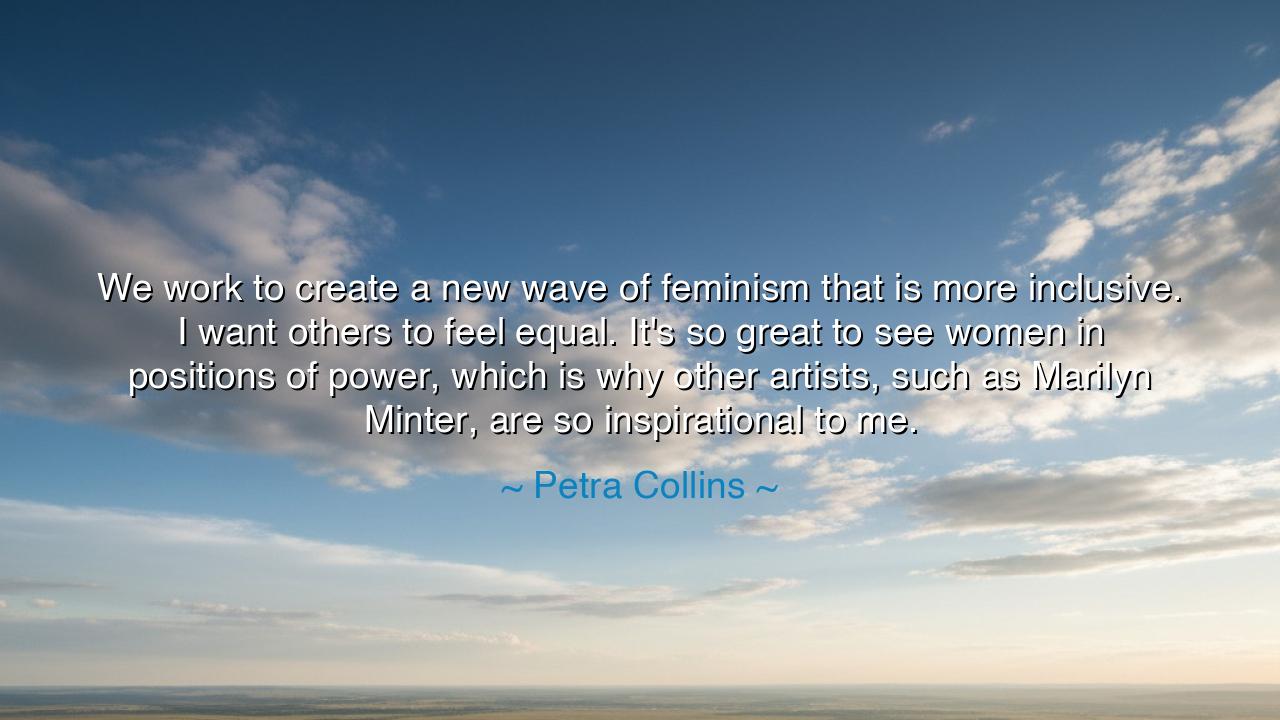
We work to create a new wave of feminism that is more inclusive.
We work to create a new wave of feminism that is more inclusive. I want others to feel equal. It's so great to see women in positions of power, which is why other artists, such as Marilyn Minter, are so inspirational to me.






In the voice of a prophet of art and equality, Petra Collins declares, “We work to create a new wave of feminism that is more inclusive. I want others to feel equal. It's so great to see women in positions of power, which is why other artists, such as Marilyn Minter, are so inspirational to me.” Her words are not merely a statement of belief; they are a summoning, a cry across generations. They remind us that every age must rediscover the meaning of freedom and reforge it in its own image. Collins speaks as one who paints not with colors alone, but with conviction — for she knows that the struggle for equality, like art itself, must be reborn anew with each era.
In her invocation of inclusivity, Petra reaches beyond the walls that once confined the feminist spirit. The ancients, too, understood that movements built upon exclusion crumble under their own weight. True revolution, she tells us, is not a fortress but a circle — one that widens to embrace the unheard, the unseen, the forgotten. The “new wave of feminism” she envisions is not forged from anger alone, but from empathy, understanding, and shared strength. It does not divide the world into conquerors and conquered, but seeks to heal what history has fractured.
To understand her vision, we must look back to the women of old who stood at the edge of impossibility and dared to step forward. Consider Hypatia of Alexandria, the philosopher and astronomer whose brilliance shone in an age that often denied women the right to think freely. She taught not only with intellect but with courage, walking calmly through streets where hatred gathered against her. Though her end was cruel, her spirit endured — not as a symbol of suffering, but as a beacon of intellectual freedom. Like Petra Collins and Marilyn Minter, Hypatia turned knowledge and art into defiance. Each, in her own time, redefined what power could look like in a woman’s hands.
Collins’s admiration for Minter is an acknowledgment of lineage — the passing of the torch from one artist-warrior to another. Minter’s work, bold and unapologetic, captures the physical and emotional texture of womanhood, neither sanitized nor shamed. She exposes truth in its raw form — glossy, messy, human. Through her, Petra sees what female power truly means: not domination, but expression; not perfection, but authenticity. Such art is not decoration — it is declaration. It says to the world: We are here, and we will be seen as we are.
And what of equality — that shining word that so many have spoken, and yet so few have truly lived? Petra’s yearning that “others feel equal” is not a demand for sameness, but for recognition. For equality does not mean blending into uniformity, but honoring difference without hierarchy. The tree does not envy the river, nor does the river seek to become the mountain — yet all are part of the same landscape. So too must society learn that power shared is not power lost, but power multiplied.
There is a quiet heroism in her words. They do not shout; they beckon. They remind us that change begins not in the roar of revolution, but in the daily act of seeing others as ourselves. It is in mentoring, in listening, in creating space where silence once ruled. The “new wave” that Collins speaks of is not a storm meant to destroy, but a tide that lifts all who have been left stranded on the shores of neglect.
Therefore, let her wisdom become our practice. Let every artist, teacher, worker, and dreamer strive to make their circle wider. Seek out the voices different from your own, and let them shape your understanding. Create not for approval, but for awakening. Honor those who came before you, as Petra honors Minter — and prepare the path for those yet to come. For equality, like art, is not a finished masterpiece but a work forever in progress.
And so the lesson endures: true feminism is not the rise of one, but the elevation of all. When power and compassion walk hand in hand, when art becomes a mirror for every soul, and when we dare to imagine a world that belongs to everyone — then, and only then, will the new wave Petra Collins speaks of become not just a vision, but a living, breathing reality.






AAdministratorAdministrator
Welcome, honored guests. Please leave a comment, we will respond soon